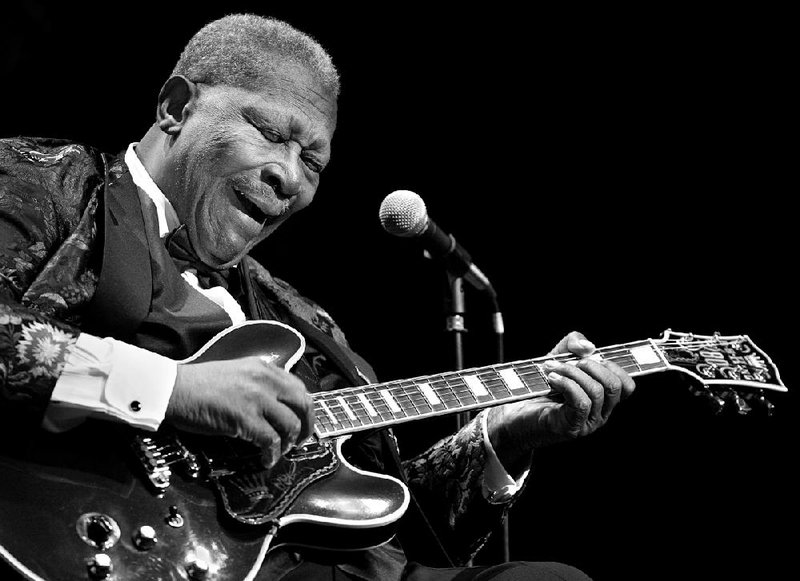B.B. King is dead. He is due an appreciation.
But how convince someone of that if they don't already appreciate the man? Do you pull down your books and run your finger through the indices until they holler Uncle? Do you root out the old records and play selected cuts, dropping the needle here and there (there are fewer needles now, but play along) on a lifetime spent on stages and in studios, fronting bands with brass and rock star sidemen?
How do you describe what B.B. King sounds like to someone who doesn't know?
The poet Rachel M. Harper tried:
He plucks the moonlight:
burnt indigo fire--
calls it blues.
Maybe there are ways to say it without invoking poetry--B.B. King's guitar sounds like what it is, T-Bone Walker and Lemon Jefferson extruded through the patient tutelage of Robert Lockwood Jr. for good measure. Listen close, you hear Lonnie Johnson, too, and Django Reinhardt. Of course, back at the beginning there is Bukka White, the cousin who bought him his first guitar, a cheap Stella acoustic.
That might mean something to you if you think in a certain kind of way, if you know the sounds associated with the names mentioned. If you think that way you'll know what it means to say the difference between B.B. King and Muddy Waters is the same as the difference between Charlie Christian and Charley Patton, or maybe between Elvis Presley and Elvis Costello.
But if you know enough to follow the line of begats, then you know what B.B. King sounds like; and if you don't know what B.B. King sounds like, no words will suffice. Trying to define the blues might be as hard as defining jazz. Or maybe any other kind of music. If you haven't listened, you don't know. You can't know. Maybe the obliqueness of poetry can crack open the door, but some things you have to feel for yourself.
B.B. King was the most famous bluesman of them all. As such, he never got credit from aficionados who like to think they know something about the art. After all, Mr. B.B. was a showman, the draw, the only real superstar that blues ever had. So sometimes you heard snark and snipe about him. There were those who'd mention that folks could hear his records on the radio on the North Side of Chicago . . . but never on the South Side.
And you'd hear that B.B. got his feelings hurt back in the 1960s, when the college kids were discovering all those singers from Mississippi, but he wasn't getting invited to the festivals. Because, some would say, B.B. King was a big star, so maybe there was something of the sellout in his act. That's the assumption some made. Or maybe it was just that the old school style of rural blues, the way they played it in the 1920s and the 1930s, seemed more exotic, more authentic--to Ivy Leaguers and professors.
Not that B.B. wasn't great, but you know, he wasn't country blues.
He was popular. He was the King to all those people who listened to the radio.
Up until a few months ago, he toured incessantly, probably too much. He said he loved it; others suggested he was being exploited by those who stood to profit from his shows. But he's plenty of time to rest now. His appreciation will come.
Editorial on 05/18/2015
